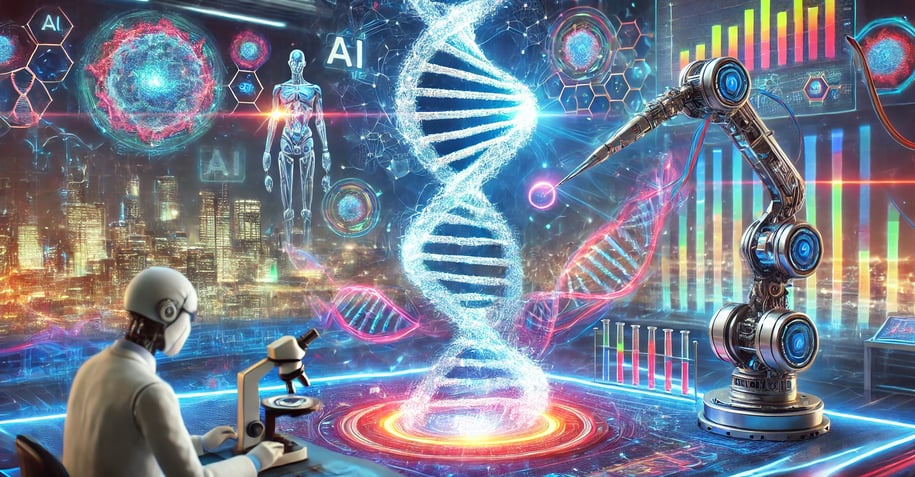GPT-4b Micro: The AI Marvel That Might Help Us Defy Aging and Redefine Life Itself!
This blog post explores GPT-4b Micro, OpenAI’s groundbreaking AI model that is transforming human health and longevity through advanced protein engineering, regenerative medicine, and cutting-edge biotech innovations.


In a world where technology evolves at lightning speed, OpenAI’s latest creation, GPT-4b Micro, stands out as a groundbreaking leap not just in AI, but in human health and longevity. Imagine a future where aging is no longer inevitable, and diseases that once seemed untreatable are cured with precision. Sounds far-fetched? Not anymore! This AI marvel is set to transform our understanding of biology and could very well be the key to unlocking longer, healthier lives. 🚀
What Exactly is GPT-4b Micro?
While most people know OpenAI for its conversational AI models like ChatGPT, GPT-4b Micro is a whole different beast. This AI isn’t designed to chat or write poetry; it’s built to decode and engineer proteins—the fundamental building blocks of life.
Proteins control almost every function in your body, from repairing damaged cells to powering your metabolism. GPT-4b Micro treats protein sequences like a complex language, using its computational might to optimize and design proteins with unparalleled precision. It’s like having a supercomputer that speaks the language of life fluently, helping scientists create more effective treatments, faster diagnostics, and even potential solutions to aging.
The Yamanaka Factor Revolution: Reprogramming Cells with AI
One of the most exciting breakthroughs driven by GPT-4b Micro is its work with Yamanaka factors—a set of four proteins that can reprogram adult cells into pluripotent stem cells (cells that can transform into any type of cell in the body).
This process holds immense promise for regenerative medicine but has been notoriously inefficient, with only about 1% of cells successfully reprogrammed—until now.
GPT-4b Micro stepped in and:
Analyzed thousands of protein sequences across species.
Suggested precise modifications to enhance the function of Yamanaka factors.
Achieved an astonishing 50x increase in reprogramming efficiency.
This means we could potentially heal damaged tissues, regenerate organs, and even reverse the effects of aging far more efficiently than ever before. Imagine a world where spinal cord injuries, heart diseases, or neurodegenerative disorders could be treated by simply reprogramming your own cells to heal you. This is no longer just a dream; it’s becoming a tangible reality.
Beyond Anti-Aging: How GPT-4b Micro is Changing Healthcare
While the anti-aging possibilities are exciting, GPT-4b Micro’s impact extends far beyond that:
Drug Discovery and Development: Traditional drug development can take over a decade. GPT-4b Micro accelerates this by designing and optimizing potential drugs in months, significantly reducing time and costs.
Personalized Medicine: Treatments tailored to your unique genetic makeup, ensuring maximum efficacy with minimal side effects.
Enzyme Engineering: Designing enzymes that can break down pollutants, produce sustainable biofuels, or improve food production processes.
Synthetic Biology: Creating new biological systems that can perform specific functions, from manufacturing bio-based materials to producing complex therapies.
The Road Ahead: When Can We Expect These Innovations in Real Life?
The burning question: How soon can we benefit from this technology?
While the breakthroughs are promising, bringing AI-engineered treatments from the lab to your local clinic is a complex journey. Experts estimate that it could take anywhere from 5 to 10 years for GPT-4b Micro’s innovations to be fully integrated into mainstream healthcare. Why the wait?
Rigorous Testing and Clinical Trials: Ensuring that new treatments are safe and effective takes time.
Regulatory Approvals: Navigating the stringent regulatory landscape for medical innovations is essential but slow.
Scaling Up Production: Developing scalable methods to produce AI-designed proteins and therapies for widespread use is another hurdle.
However, with the pace at which AI and biotech are evolving, and with billions being poured into longevity research, we might see these timelines shrink significantly. Every day, new breakthroughs bring us closer to a future where aging is just another challenge that technology has overcome.
Why This Matters: The Promise of AI-Driven Longevity
Let’s face it—aging, illness, and degenerative diseases affect everyone. The promise of GPT-4b Micro is not just about living longer; it’s about living better:
Extended Healthspan: More years of active, vibrant life without the burden of chronic illnesses.
Faster Medical Solutions: Quicker development of treatments for conditions that currently have limited options.
Affordable Healthcare: Reducing the costs of drug development and treatments through AI optimization.
The intersection of AI and biology is set to revolutionize not just healthcare, but our entire experience of life. With GPT-4b Micro, we’re not just talking about adding years to life—we’re talking about adding life to years.
The Future is Now: What to Expect Next
As GPT-4b Micro continues to evolve, here’s what we can expect:
More Efficient Therapies: AI-designed drugs and treatments hitting the market faster than ever.
Advances in Regenerative Medicine: Treatments for conditions like Parkinson’s, Alzheimer’s, and spinal cord injuries becoming more accessible.
Biotech Boom: A surge in biotech startups leveraging AI to solve complex biological problems.
Public Access: While it may take time, the goal is to make these advancements accessible to everyone, transforming global healthcare standards.
Final Thoughts: Are We Ready for the AI-Driven Health Revolution?
The potential of GPT-4b Micro is immense, and while challenges remain, the path ahead is clear: a future where AI not only enhances our digital lives but also our biological ones. From reversing aging to curing once-incurable diseases, this AI is set to redefine what it means to be human.
The future isn’t just coming—it’s already here. And it’s more exciting than we ever imagined.
